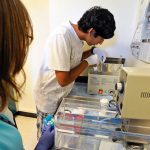Through a generous $300,000 award from the Jack Kent Cooke Foundation, high school seniors enrolled in the foundation’s Young Scholars Program will be able to pursue areas of interest and advanced learning for a three-week residential program housed on the University of Connecticut’s Storrs campus in the summer of 2018.
Since 2001, the Fulbright Specialist Program has been pairing a selection of top U.S. faculty experts and other professionals from a variety of disciplines with foreign host institutions for anywhere between two and six weeks to serve as consultants — sharing their knowledge and skills, and taking part in activities that support the host institution’s priorities and goals — while being immersed in other cultures.
Board of Trustees Distinguished Professor of Educational Psychology Scott Brown, who is certified as a Fulbright Specialist, accepted an assignment that sent him this past month to Pontificia Universidad Javeriana (Pontifical Xavierian University) in Cali, Colombia.
At UConn, Craig Kennedy will also be a faculty member in the Neag School of Education’s Department of Educational Psychology and will receive a “courtesy appointment” in the School of Medicine’s Department of Pediatrics.
A growing awareness of the prevalence of childhood exposure to trauma and an increased understanding of its corrosive, potentially lifelong impacts on health and behavior together are fueling a national movement to create trauma-informed schools, says InCHIP Principal Investigator (PI) Sandra Chafouleas.
It’s no secret that traditional intelligence tests often fail to capture the true essence of a student’s capabilities. Educational psychologist Joseph Renzulli, who has spent more than 40 years studying gifted education, notes, “The Achilles heel of gifted education has been its inability to adequately include children who do not fall into the nice, neat stereotype of good test-takers and lesson-learners — ethnic minorities, underachievers, children who live in poverty, and young people who show their potential in nontraditional ways.”
Through a generous $300,000 award from the Jack Kent Cooke Foundation, high school seniors enrolled in the foundation’s Young Scholars Program will be able to pursue areas of interest and advanced learning for a three-week residential program housed on the University of Connecticut’s Storrs campus in the summer of 2018.
A new grant to support Connecticut teachers, the Rogers Educational Innovation Fund, has been established by the Neag School of Education thorough a legacy gift of $125,000 from Neag School Professor Emeritus Vincent Rogers. The expanded Rogers Educational Innovation Fund will provide a $5,000 grant annually in support of innovative projects carried out by teachers in Connecticut.
Amid calls to strengthen civic education, IES has funded several interventions that are leveraging technological innovation and game design to engage students.
University of Connecticut Professor Emeritus Vincent Rogers has announced an endowment to the University’s Neag School of Education, designating a legacy gift of $125,000 to expand the Rogers Educational Innovation Fund, according to the fund’s website. With the expansion, “The Rogers Award” will provide $5,000 annually to an elementary or middle school teacher in the state of Connecticut for use in the classroom, the fund’s website said.
The Hartford Foundation for Public Giving has awarded funding for a project focused on leadership training through the UConn Administrator Preparation Program (UCAPP), a school leadership program based at the Neag School that prepares highly qualified school administrators in Connecticut.




